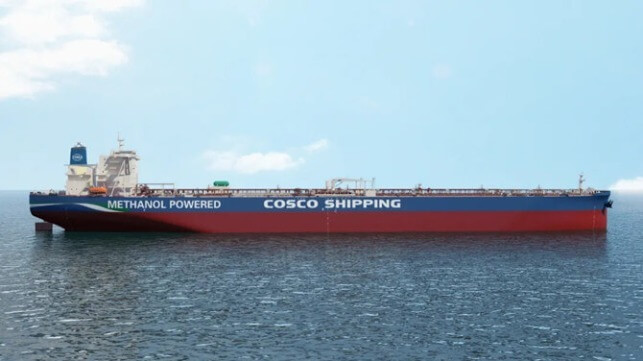Class Societies Approve China’s First Design for Methanol-Fuel VLCC

Expanding on their previous design for an LNG-powered supertanker, China’s Dalian Shipbuilding Industry Company (DSIC) and COSCO Shipping Energy have developed designs for China’s first domestic methanol dual-fuel VLCC. Working to meet the growing global demand for carbon-free fuel options, the companies report that their crude oil tanker design has obtained two Approval in Principle certificates in independent reviews working with DNV and China Classification Society (CCS).
According to the companies, this ship is a low-carbon/zero-carbon alternative jointly developed in response to the trend for low-carbon shipping seeking to leverage the relative high maturity in technological development and interest in methanol. They noted the strong interest in methanol and especially green methanol as an emerging alternative fuel for the shipping industry.
The design is based on the latest generation of 310,000 dwt VLCCs designed and built by Dalian Shipbuilding Industry Corporation. The methanol-fueled ship would be equipped with two methanol fuel tanks with a total of 10,000 m³, which they said will meet the fuel requirements of the ship's main engine, auxiliary engine, and boiler for the entire voyage. The vessel is designed with a range of 2,3000 nautical miles.
The partners jointly carried out the design evaluation of the overall arrangement of the ship, the selection and arrangement of fuel tanks, and the fuel system. They provided a full range of technical services for the design of the ship in terms of compliance verification and design optimization.

that matters most
Get the latest maritime news delivered to your inbox daily.
Last year, the same partnership completed the world’s first LNG-fueled VLCC which they reported also adopted several design features to improve total performance. The 318,000 dwt tanker was ordered in 2017 as a conventional VLCC but amended in 2020 to convert the vessel to LNG as its main fuel, supplemented by oil. The ship has a total length of about 1,091 feet.
COSCO Shipping reported that it will continue to work on R&D efforts with China’s shipbuilding industry to develop more dual-fuel and low carbon shipping alternatives.
